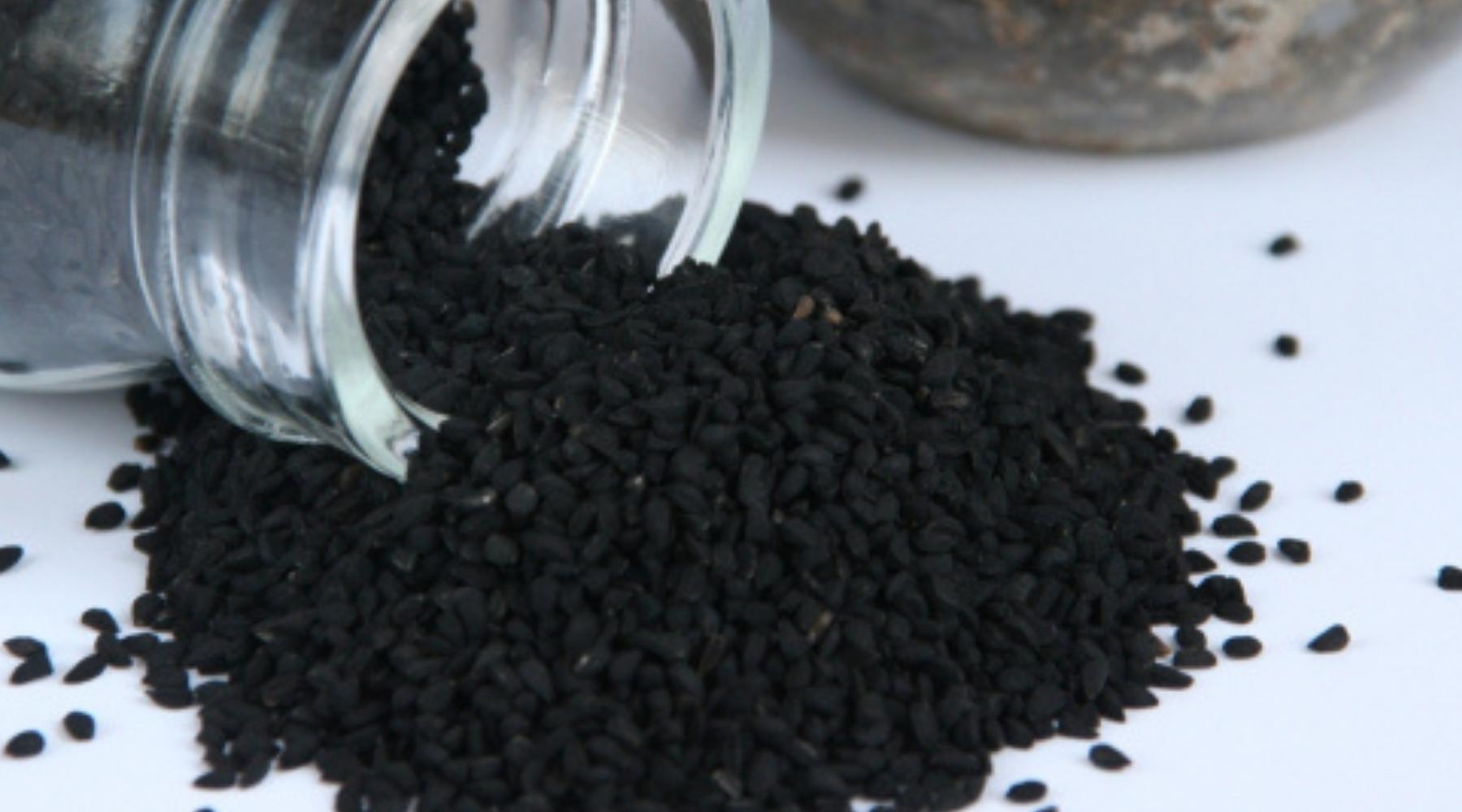February 22, 2022
Schwarzkümmel: Das Gold der Pharaonen

Schon die alten Ägypter wussten den wunderbaren Schwarzkümmel zu schätzen. Fläschchen mit Schwarzkümmelöl und Schwarzkümmelsamen in Grabstätten der Pharaonen sind ein klarer Hinweis auf die Bedeutung des Gewürzes. Denn eines wissen wir ganz genau: Auf die Reise ins Leben nach dem Tod nahm ein Pharao nur das Wertvollste mit. Neben der kulinarischen Verwendung von Schwarzkümmel ist das Gewürz für seine medizinischen Eigenschaften bekannt. (1)
Welche Vorteile Schwarzkümmel zu bieten hat und wie du das legendäre Gewürz unkompliziert in dein tägliches Menü integrieren kannst, erfährst du, wenn du weiter liest.
Steckbrief
Name: Echter Schwarzkümmel (Nigella sativa)
Heimat: Die ursprüngliche Heimat des Echten Schwarzkümmels befindet sich in Westasien, im Irak und der Türkei. Er gedeiht auch in Südeuropa, Indien, Pakistan und Nordafrika.
Geschmack: Erinnert an Sesam, schmeckt nussig mit einer leichten Kreuzkümmelnote
Spitzname: „Segenreicher Samen“
Zu finden in: Muse, Bauchflüsterer
Geschmack: Erinnert an Sesam, schmeckt nussig mit einer leichten Kreuzkümmelnote
Spitzname: „Segenreicher Samen“
Zu finden in: Muse, Bauchflüsterer
Detaillierte Artikel zu unseren Gewürzmischungen findest du hier: Die Muse-Gewürzmischung; der Bauchflüsterer-Gewürzmischung.
Inhaltsverzeichnis
Schwarzkümmel – würzig, lecker und gesund
Das Hahnenfußgewächs Schwarzkümmel ist – trotz der ähnlich klingenden Namen – weder mit Kümmel noch mit Kreuzkümmel verwandt. (2) Echter Schwarzkümmel wächst als krautige Pflanze und produziert eine Balgfrucht mit Samen. Und genau diese kleinen schwarzen Samen werden in vielen Küchen der Welt zum Verfeinern von Speisen verwendet. Schwarzkümmel wird aber auch in der traditionellen Medizin (zum Beispiel im Ayurveda) als natürliches Heilmittel bei vielen gesundheitlichen Beschwerden eingesetzt – von Bronchitis bis hin zu Durchfall. (3)
Schwarzkümmel als Heilmittel ist in Europa erst gerade erst im Kommen. Vielmehr kennen wir Deutschen das Gewürz vom türkischen oder arabischen Fladenbrot, das mit den Samen bestreut wird. Liebhaber der orientalischen Küche können das sesamähnliche Aroma mit der leichten Kreuzkümmelnote in Salaten, Gemüse- oder Fleisch- und Geflügelgerichten herausschmecken.
Die Wirkung von Schwarzkümmel: Universalmedizin aus Tausendundeiner Nacht
„Schwarzkümmel heilt jede Krankheit, außer den Tod“, sagte mal der islamische Prophet Mohammed. Das ist sicherlich eine Hyperbel, aber auch ein guter Hinweis darauf, dass das Gewürz ein echtes Multitalent ist. Tatsächlich wird die gesundheitsfördernde Wirkung von Schwarzkümmel auch von der modernen Medizin anerkannt. (3) Schwarzkümmel hat einen hohen Gehalt an Antioxidantien, was vor ernsthaften chronischen Erkrankungen schützen kann – darunter Krebs, Diabetes, Herzerkrankungen und Fettleibigkeit. (4) (5)
Das Wundergewürz kann aber noch mehr: den Cholesterinspiegel senken (6), die Leber schützen (9) und bei der Regulierung des Blutzuckers helfen (10). Außerdem wirkt Schwarzkümmel antibakteriell und entzündungshemmend. (7) (8) Zum Schluss noch eine gute Nachricht an alle Allergiegeplagten: Schwarzkümmel kann bei Heuschnupfen und Asthma helfen, das haben mehrere Studien bei Patienten mit Asthma bronchiale, Heuschnupfen und atopischem Ekzem gezeigt. (11)
Vorsicht! Schwarzkümmel kann die Kontraktion von Muskeln stimulieren, einschließlich der Gebärmutter. (12) Daher solltest du auf die Anwendung von Schwarzkümmel während der Schwangerschaft lieber verzichten. Säuglinge und Kleinkinder sollten ebenfalls keinen Schwarzkümmel bekommen – die ätherischen Öle der Samen könnten den noch sehr empfindlichen Magen reizen.
Rezepte mit Schwarzkümmel: Das gesunde Gewürz in deinem Speiseplan
Schwarzkümmel kannst du auf drei verschiedene Arten zu dir nehmen: als Samen, als Öl oder in einer Gewürzmischung.
- Pure Schwarzkümmelsamen: Schmecken weniger intensiv als das Öl und machen ein schönes Topping für jeden Salat her. Du kannst die Samen vorher leicht anrösten, damit sie ihr volles Aroma entwickeln können.
- Schwarzkümmelöl: Schmeckt sehr nussig und herb – für manchen Gaumen etwas gewöhnungsbedürftig. Du kannst es mit Olivenöl und Zitronensaft mischen und damit so ziemlich jedes Gemüse verfeinern.
- Gewürzmischung: Schwarzkümmel harmoniert prima mit vielen Gewürzen, wie zum Beispiel Kreuzkümmel, Fenchel- oder Senfsamen, Pfeffer, Koriander, Anis. Wenn du es feurig magst, dann probier doch mal die südasiatische Gewürzmischung Panch Phoron. Sie beinhaltet Schwarzkümmel, ebenso wie die nordafrikanische Mischung Dukkah. Falls du es weniger scharf magst, dann kannst du auf die Brox-Gewürzmischungen Bauchflüsterer und Muse zurückgreifen. Damit kreierst du leckere authentische Gerichte für den europäischen Gaumen.
Quellenverzeichnis:
- (1) Al-Ghasham A, Ata HS, El-Deep S, Meki AR, Shehada S. Study of protective effect of date and nigella sativa on aflatoxin b(1) toxicity. Int J Health Sci (Qassim). 2008;2(2):26-44. (Link)
- (2) https://de.wikipedia.org (Link)
- (3) Ahmad A, Husain A, Mujeeb M, et al. A review on therapeutic potential of Nigella sativa: A miracle herb. Asian Pac J Trop Biomed. 2013;3(5):337-352. doi:10.1016/S2221-1691(13)60075-1 (Link)
- (4) Leong XF, Rais Mustafa M, Jaarin K. Nigella sativa and Its Protective Role in Oxidative Stress and Hypertension [published correction appears in Evid Based Complement Alternat Med. 2013;2013:253479]. Evid Based Complement Alternat Med. 2013;2013:120732. doi:10.1155/2013/120732 (Link)
- (5) Pham-Huy LA, He H, Pham-Huy C. Free radicals, antioxidants in disease and health. Int J Biomed Sci. 2008;4(2):89-96. (Link)
- (6) Sahebkar A, Beccuti G, Simental-Mendía LE, Nobili V, Bo S. Nigella sativa (black seed) effects on plasma lipid concentrations in humans: A systematic review and meta-analysis of randomized placebo-controlled trials. Pharmacol Res. 2016;106:37-50. doi:10.1016/j.phrs.2016.02.008 (Link)
- (7) Hannan A, Saleem S, Chaudhary S, Barkaat M, Arshad MU. Anti bacterial activity of Nigella sativa against clinical isolates of methicillin resistant Staphylococcus aureus. J Ayub Med Coll Abbottabad. 2008;20(3):72-74. (Link)
- (8) Morsi NM. Antimicrobial effect of crude extracts of Nigella sativa on multiple antibiotics-resistant bacteria. Acta Microbiol Pol. 2000;49(1):63-74. (Link)
- (9) Mollazadeh H, Hosseinzadeh H. The protective effect of Nigella sativa against liver injury: a review. Iran J Basic Med Sci. 2014;17(12):958-966. (Link)
- (10) Daryabeygi-Khotbehsara R, Golzarand M, Ghaffari MP, Djafarian K. Nigella sativa improves glucose homeostasis and serum lipids in type 2 diabetes: A systematic review and meta-analysis. Complement Ther Med. 2017;35:6-13. doi:10.1016/j.ctim.2017.08.016 (Link)
- (11) Prof. Dr. Sigrun Chrubasik-Hausmann. Schwarzkümmel (Nigella sativum) (Link)
- (12) Aqel M, Shaheen R. Effects of the volatile oil of Nigella sativa seeds on the uterine smooth muscle of rat and guinea pig. J Ethnopharmacol. 1996;52(1):23-26. doi:10.1016/0378-8741(95)01330-x (Link)






